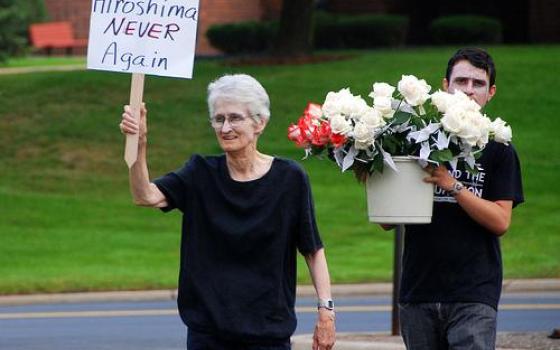As a Maryknoll sister, Jean Fallon spent more than 20 years as a missionary in Japan. Arriving just two years after the end of the World War II and working in parish ministries, Fallon became intimately acquainted with the needs of a people devastated by the atomic bomb. Since then, she has co-authored two books on peace and the aftermath of Hiroshima and Nagasaki, and she has been a tireless advocate for the abolition of nuclear weapons.
Fallon currently serves as part of the Maryknoll delegation at the United Nations and, in May, she received the Sister Christine Mulready Peacemaker Award from Pax Christi Metro New York.
Why are you passionate about abolishing nuclear weapons?
The source of my interest in nuclear weapons, of course, is Hiroshima and Nagasaki. Once you have been there, you can never say that it is good. But this is all about money. When it comes down to it, people are trying to make us think that nuclear weapons are a protection when they are a danger – the very thing we need to fear.
Do you think we’ll ever get to a place where we regard nuclear weapons as a danger?
I do. At some point, the people of the world are going to wake up. They’re just going to get to a point in the world where they’re going to say, “If we don’t stop this, there’s not going to be anything left on Earth. Everybody’s going to be refugees, so cut it out.” Governments hold all the power, and so do all the industries that support that; they have all the power in their hands. However, there’s more than one power at play here, and that’s the power of the people and the power of God.
So let’s say we abolish nuclear weapons tomorrow. What other peace issues are you invested in? What do you see as the biggest challenge facing us today?
You know what really scares me? Forget the atom bomb and start thinking about guns in the United States. What is it that makes people think they have to have a gun? And that they have to carry it everywhere and show it off to everybody? That’s not about a right. That’s something else altogether, and it has to do with our mentality. What we need is a psychological examination nationwide.
Do you think Christians in particular are called to peace work?
Making peace is not about the issues that we are up against. It’s about ourselves – how we live and think as Christians, especially. That’s an extremely important point: that Jesus Christ was nonviolent. In the moment he was arrested, they pulled out a sword and Jesus said, “Enough! Put away your swords!” And, you know, that’s an admonishment. If we are following Jesus, we have to follow him. There’s no other choice – either that or leave the church.
[Dawn Cherie Araujo is a staff writer for Global Sisters Report.]

